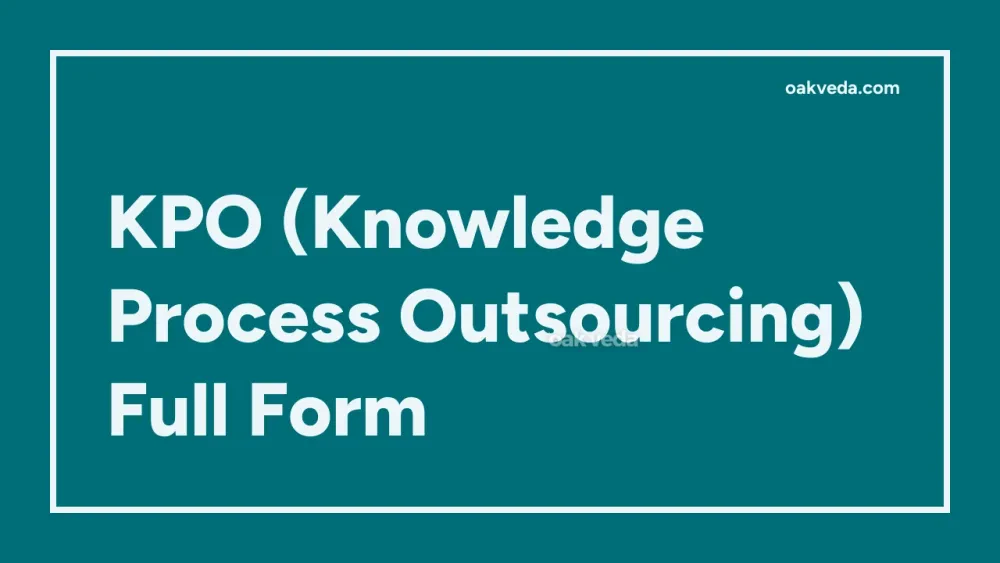
What is the Full Form of KPO?
The full form of KPO is Knowledge Process Outsourcing. This term refers to the practice of outsourcing core business operations that involve high-level information processing and analysis. KPO has become an integral part of many organizations' strategies to enhance their competitive edge and streamline their operations.
What is Knowledge Process Outsourcing?
Knowledge Process Outsourcing (KPO) is a specialized form of outsourcing that focuses on high-value, knowledge-intensive business processes. Unlike traditional Business Process Outsourcing (BPO), which typically involves routine tasks, KPO deals with complex operations that require advanced analytical and technical skills, as well as deep domain expertise.
Origin and Development of Knowledge Process Outsourcing
The concept of KPO emerged as an evolution of BPO in the early 2000s. As businesses realized the potential of outsourcing more complex tasks, KPO gained traction. Initially centered in India due to its large pool of skilled professionals, KPO has since expanded to other regions, including Eastern Europe and Sri Lanka.
How does Knowledge Process Outsourcing work?
KPO works by transferring knowledge-intensive business processes to external service providers. These providers offer specialized expertise and resources that may not be available in-house. The process typically involves:
- Identifying core processes that can be outsourced
- Selecting a suitable KPO partner
- Transferring knowledge and establishing communication channels
- Implementing quality control measures
- Continuously monitoring and improving the outsourced processes
Types of Knowledge Process Outsourcing
KPO encompasses a wide range of services across various industries. Some common types include:
- Research and Development (R&D): Outsourcing scientific research and product development
- Legal Process Outsourcing (LPO): Delegating legal research and documentation
- Financial Research and Analytics: Outsourcing financial modeling and investment research
- Healthcare Analytics: Analyzing medical data and conducting clinical research
- Engineering Services: Outsourcing product design and engineering tasks
- Market Research and Analytics: Conducting market studies and consumer behavior analysis
Functions of Knowledge Process Outsourcing
KPO serves several crucial functions in modern business operations:
- Expertise Augmentation: Providing access to specialized skills and knowledge
- Cost Optimization: Reducing operational expenses while maintaining quality
- Scalability: Allowing businesses to scale operations quickly
- Innovation Support: Facilitating research and development initiatives
- Focus on Core Competencies: Enabling organizations to concentrate on their primary business functions
Applications of Knowledge Process Outsourcing
KPO finds applications across various sectors:
- Pharmaceuticals: Drug discovery and clinical trials
- Finance: Risk assessment and portfolio management
- Technology: Software development and data analytics
- Legal: Patent applications and legal research
- Healthcare: Medical imaging analysis and telemedicine
- Education: E-learning content development and academic research
Features of Knowledge Process Outsourcing
Key features that distinguish KPO include:
- High-level Expertise: Requires advanced degrees and specialized knowledge
- Value Addition: Focuses on creating intellectual property and strategic insights
- Complex Problem-Solving: Involves tackling intricate business challenges
- Customization: Tailored solutions for specific business needs
- Continuous Learning: Demands ongoing skill development and knowledge acquisition
Benefits of Knowledge Process Outsourcing
Organizations can reap several advantages from implementing KPO:
- Access to Global Talent: Tapping into a worldwide pool of skilled professionals
- Cost Efficiency: Reducing operational costs without compromising quality
- Improved Productivity: Leveraging specialized expertise for enhanced output
- Flexibility: Adapting quickly to changing market demands
- Focus on Core Business: Freeing up internal resources for strategic initiatives
- 24/7 Operations: Utilizing time zone differences for round-the-clock productivity
- Risk Mitigation: Distributing business risks across multiple locations
Limitations or Challenges of Knowledge Process Outsourcing
Despite its benefits, KPO also faces several challenges:
- Data Security Concerns: Risk of sensitive information leakage
- Quality Control: Ensuring consistent high-quality output from external providers
- Cultural and Communication Barriers: Overcoming differences in work culture and language
- Intellectual Property Protection: Safeguarding proprietary knowledge and innovations
- Dependency on Service Providers: Potential over-reliance on external expertise
- Regulatory Compliance: Navigating complex international laws and regulations
- Employee Resistance: Overcoming internal opposition to outsourcing core functions
Future Developments in Knowledge Process Outsourcing Technology
The future of KPO is closely tied to technological advancements:
- Artificial Intelligence Integration: Enhancing decision-making processes
- Blockchain for Security: Improving data protection and transparency
- Cloud-based Collaboration: Facilitating seamless global teamwork
- Robotic Process Automation: Automating routine aspects of knowledge work
- Virtual and Augmented Reality: Revolutionizing training and remote collaboration
FAQs on KPO Full Form
-
What distinguishes KPO from BPO? KPO involves high-level knowledge work, while BPO typically deals with routine operational tasks.
-
Which industries benefit most from KPO? Finance, healthcare, technology, and pharmaceuticals are among the top beneficiaries of KPO.
-
Is KPO suitable for small businesses? Yes, KPO can benefit small businesses by providing access to expertise they might not be able to afford in-house.
-
How can companies ensure data security in KPO? By implementing strict data protection policies, using secure communication channels, and choosing reputable KPO partners.
-
What skills are most in demand for KPO professionals? Advanced analytical skills, domain expertise, problem-solving abilities, and excellent communication skills are highly valued in KPO.
In conclusion, Knowledge Process Outsourcing (KPO) has emerged as a powerful tool for businesses seeking to leverage global expertise and optimize their operations. While it presents challenges, particularly in data security and quality control, the benefits of KPO in terms of cost efficiency, access to specialized skills, and improved productivity make it an attractive option for many organizations. As technology continues to evolve, KPO is likely to play an increasingly significant role in shaping the future of global business operations.
You may be interested in:

